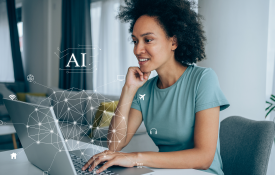Connected devices—the Internet of Things (IoT)—have already profoundly changed how we interact with the world around us. Smart home devices let us change the temperature, preheat the oven or unlock the door from the couch—or the other side of the world. Smartwatches and other wearables are changing healthcare, allowing patients and caregivers to track vitals from their smartphones. Businesses, too, have embraced the exponential potential of interconnected devices. If an aspect of business operations can be measured, tracked or otherwise controlled, chances are high that an IoT device is involved.
Now, the business world stands on the edge of a much bigger transformation. Businesses are finally solving the classic Big Data problem: how to find actionable signals in the deluge of IoT data noise to unlock the insights that will drive the future of smart business – by accelerating the adoption of IoT devices along with the advance of sophisticated and practical artificial intelligence (AI) technologies.
IoT revolutionizing retail
One needn’t hunt down obscure, one-off use cases to see real-world examples of how IoT and AI are coming together to drive transformational change and create new possibilities in the business world. In the retail world, IoT is being used across every aspect of business operations—and the biggest brands in the world are staking their future on it.
IoT technologies are powering a complete overhaul of retail supply chains—more critical than ever in the face of ongoing global disruptions that have left retailers with bare shelves and empty warehouses. Real-time monitoring of every node in a complex supply chain enables retailers to accurately track, predict and plan for future demand. Smart shelves connect the feedback loop—not just ensuring shelves remain stocked, but triggering automatic ordering workflows for intelligent inventory management. Connected technologies across the retail floor drive smarter facility management, helping retailers deliver consistently outstanding in-store experiences. Tracking technologies are also helping retailers understand shoppers’ in-store behaviors, as well as allowing them to control traffic (for public health purposes) and steer traffic (for marketing and merchandising purposes). Finally, linking smart stores with customers’ smartphones—and even VR and AR technologies—is allowing the most innovative retailers to create immersive, personalized shopping experiences.
Download white paper to know more
